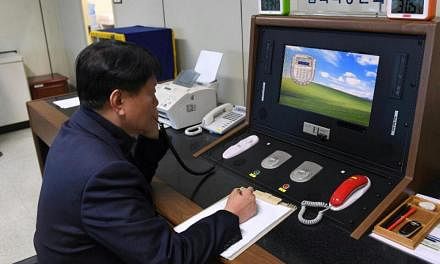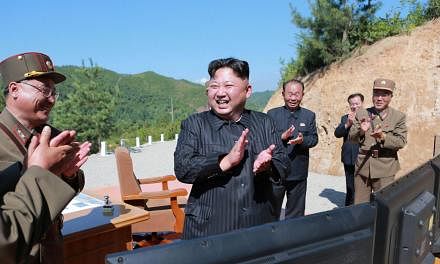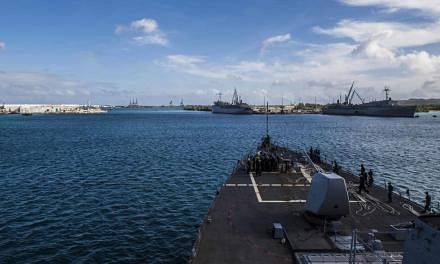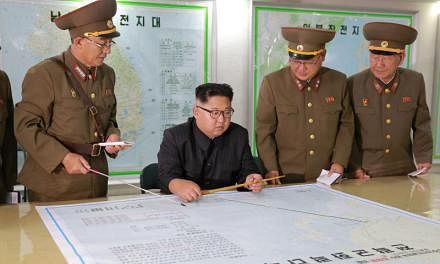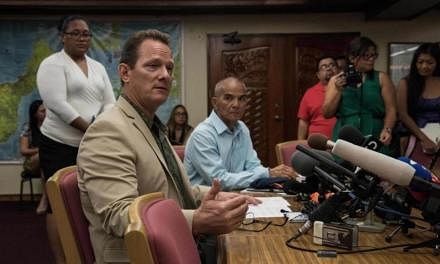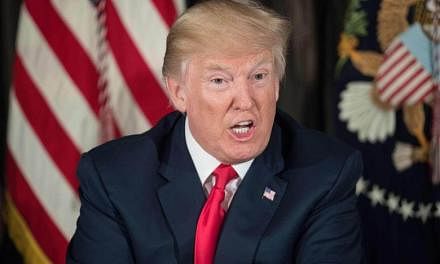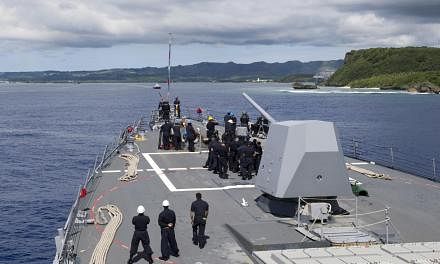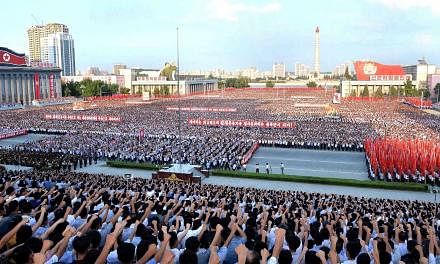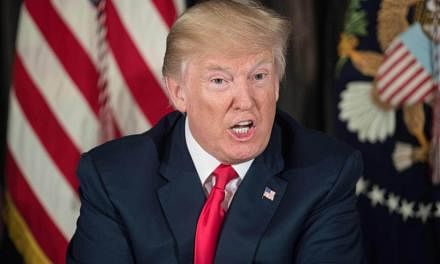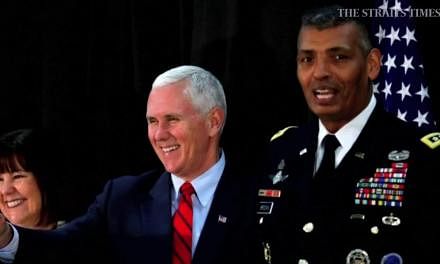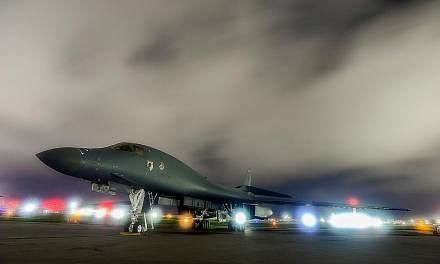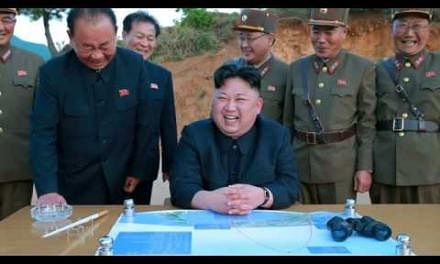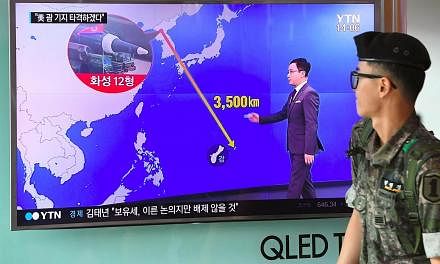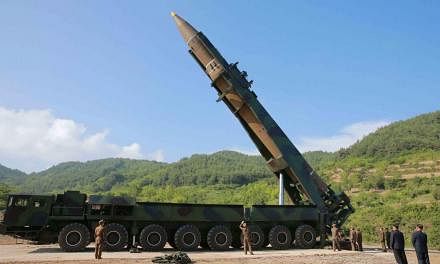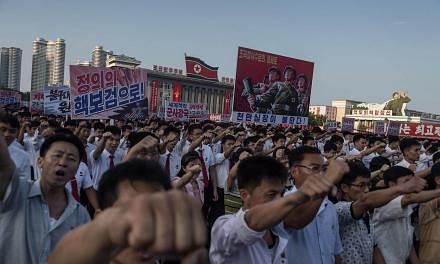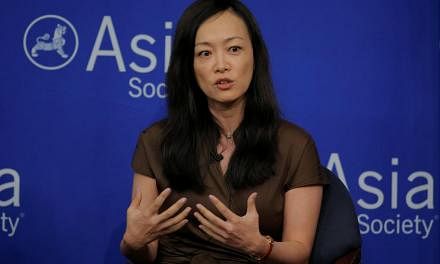SEOUL (BLOOMBERG, AFP) - Tens of thousands of troops from the United States, South Korea and several other countries will conduct drills over the next few weeks to prepare for a possible war with North Korea.
The annual Ulchi-Freedom Guardian military exercises - named after a general who defended an ancient Korean kingdom from Chinese invaders - will start on Monday (Aug 21).
It routinely sparks condemnation from North Korea, and this year is no different. Pyongyang views it as a highly provocative rehearsal for an invasion of its own territory, and threatens strong military counteraction each year.
The state-run Korean Central News Agency this week called them "reckless sabre-rattling" and warned that they could spark an accidental war.
The drills are important for another reason: China has called on the US to halt them in order to start talks with North Korea, part of its freeze-for-freeze proposal that would also require North Korea leader Kim Jong Un to suspend nuclear and missile tests.
The US rejects this outright, and scaling down the drills now would make President Donald Trump look weak so soon after his warnings of "fire and fury".
Still, some former American officials and analysts are saying at least some drills should be up for negotiation.
Mr William McKinney, a retired Army colonel who spent more than 40 years involved in US-Korea military relations and planning, said the US should consider suspending larger exercises - provided it gets something in return.
Neither the one next week or a large one usually held in March would impact US readiness, and they could be replaced with more targeted drills that focus on command and control systems, he said.
BARGAINING CHIP
"If there is a point in time when a degree of trust exists between the two parties for a quid pro quo agreement, then one or both exercises might be up for being suspended," said Mr McKinney, the non-resident Korea chairman at the Centre for Strategic and International Studies. "I am not looking to see a unilateral suspension, but at some point they might be a bargaining chip."
General Joseph Dunford Jr, chairman of the Joint Chiefs of Staff, said on Thursday that the exercises were important for the alliance to maintain the ability to defend itself. They could be reduced if North Korea were to pursue denuclearisation and cease ballistic missile tests, he said.
"As long as the threat from North Korea exists, we need to maintain a high state of readiness to respond to that threat," General Dunford told reporters in Beijing. Military exercises are "not currently on the table as part of the negotiations in any way".
Tensions on the Korean peninsula appeared to calm down this week after Mr Trump praised Mr Kim for waiting to fire missiles over Japan into waters near Guam. He has previously said military force is an option to prevent Mr Kim from gaining an intercontinental ballistic missile that could deliver a nuclear weapon to the US.
BUCK PASSING
In the past, the drills have raised tensions. During last year's exercises, North Korea launched a ballistic missile from a submarine and put its military on the highest alert.
Formal talks on North Korea's nuclear programme collapsed in 2009, and the US has resisted restarting them until Mr Kim demonstrates a commitment to denuclearisation and halts tests of missiles and nuclear devices. North Korea on the other hand wants the US to drop its hostile policies before agreeing to talks.
China's proposal for talks is not sincere, according to Mr Ryan Hass, a fellow at the Brookings Institution in Washington.
"The dual freeze approach is China's attempt at buck passing and moral equivalency between US actions and North Korean actions," he said. "Buck passing in the sense that Beijing is not making a genuine effort to leverage a freeze. They are making a genuine effort to pin responsibility on the United States."
Last year's Ulchi-Freedom Guardian event involved nearly 80,000 troops in land, sea and air drills. The US and South Korea have not released many details on this year's event.
BURNT BEFORE
Some analysts see room for manoeuvre. Mr Kim's regime only wants the US to cancel military drills that prepare for removing him from power and detonating nuclear weapons, Mr Joel Wit, a former state department official, wrote in the Atlantic magazine on Aug 13.
"As any informed military planner will tell you, that's possible while also maintaining the readiness of American forces on the Korean peninsula," wrote Mr Wit, who met with North Korean officials in Geneva after Mr Trump's election win. "And had Pyongyang halted testing in 2015, Washington wouldn't be facing the imminent threat of a North Korean ICBM today."
The US has been burnt before when it suspended military exercises.
In the 1990s, the large-scale Team Spirit exercises between the US and South Korea were cancelled several times in a bid to get the North Koreans to abandon their nuclear programme. Pyongyang eventually reneged on an agreement to dismantle its nuclear reactors - one among many reasons the US does not trust North Korea.
Associate Professor Vipin Narang at the Massachusetts Institute of Technology specialising in nuclear strategy, warned against another suspension.
"Cancelling it would cede into the huge North Korean aim to decouple the allies and drive a wedge between South Korea and the United States," Prof Narang told AFP.
Still, that should not stop the US from exploring a deal, said Associate Professor John Delury of Chinese studies at Yonsei University in Seoul.
"If you are going to suspend exercises you should get something pretty good from the North Koreans for it," Prof Delury said. "It is not something to do as a simple goodwill gesture."
B-1B BOMBER
The allies could look to make a conciliatory gesture towards Pyongyang by not involving US strategic assets such as stealth bombers or aircraft carriers, said Professor Koo Kab Woo at the Seoul-based University of North Korean Studies.
Supersonic B-1B bombers from the US Pacific Command's Andersen Air Force Base in Guam are often flown over the peninsula for joint exercises and to demonstrate Washington's "full range of military capabilities", and this has always infuriated Pyongyang.
In an ideal scenario, the two sides would agree that North Korea could not carry out missile tests that overfly South Korea or Japan - which would preclude them getting anywhere near Guam - in exchange for the US ending strategic bomber training flights within an agreed distance of the North, said Mr James Acton, co-director of the Nuclear Policy programme at the Carnegie Endowment for International Peace.
North Korea appears to have left open some room for a quid pro quo, added Prof Narang.
Any negotiation for a quiet agreement to reduce the frequency and range of the B-1B flights "doesn't have to be terribly public and it could be behind the scene", he said. "I think it's reasonable to think that might go somewhere."
